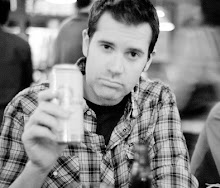 In last month’s issue of Esquire, Chuck Klosterman wrote an interesting piece on the passing of Norman Mailer and, primarily, our inability to relate to the sport of boxing because we no longer worry about physical confrontations in our own lives.
In last month’s issue of Esquire, Chuck Klosterman wrote an interesting piece on the passing of Norman Mailer and, primarily, our inability to relate to the sport of boxing because we no longer worry about physical confrontations in our own lives.He makes a compelling argument and he may even be right, but while Klosterman notes that “we currently inhabit the most peaceful era of human existence” (per cognitive scientist Steven Pinker), I think this is largely irrelevant. Pinker’s work compares the present day to centuries past, and as individuals, we have no perception of change on that scale. More relevant is our perception of change during our own lifetimes.
It’s probably true that when I was a kid it seemed more common for grown men to scuffle (though it may not have been). And learning to fight seemed like a skill that could be valuable. But I think a big reason why the brawling I naively expected has never come about is guns.
The days where you could get into an argument at a bar and suggest it might be time to step outside are over. Not because we’re too chicken to fight (though maybe we are), but because we’re unwilling to risk escalating a situation to a level we’re not prepared for. We can no longer trust the other guy to not pull a gun.
(To take this argument to a very Klosterman place, I'd argue the American fistfight has disappeared right along with the mid-range jumper in the NBA. Just as pro ball is all three-pointers and dunks, our altercations are either verbal or homicidal. The middle ground has disappeared.)
 Not only has gun-related crime been covered more by the media, gun use is actually up compared to my childhood years. I don’t think typical American men in the ‘70s and early ‘80s worried much about an angry commuter pulling a gun on them at a red light. Data from the Department of Justice (charted above) might even support that. Though the numbers for aggravated assault with a firearm are way down from the early ‘90s, they’re still about 50% higher than when I was in grade school. (And surely the violence of the ‘90s is still in our collective subconscious.)
Not only has gun-related crime been covered more by the media, gun use is actually up compared to my childhood years. I don’t think typical American men in the ‘70s and early ‘80s worried much about an angry commuter pulling a gun on them at a red light. Data from the Department of Justice (charted above) might even support that. Though the numbers for aggravated assault with a firearm are way down from the early ‘90s, they’re still about 50% higher than when I was in grade school. (And surely the violence of the ‘90s is still in our collective subconscious.)So while I agree that boxing has lost its relevance because American men are no longer concerned with fisticuffs of their own, the reason for the latter is not really a decreased sense of violence around us, it’s an increased sense of the unpredictability and seriousness of that violence.
Thanks to DY for directing me to the Klosterman article.

1 comment:
Yeah. Chuck's a hack. (kidding.) - DY
Post a Comment